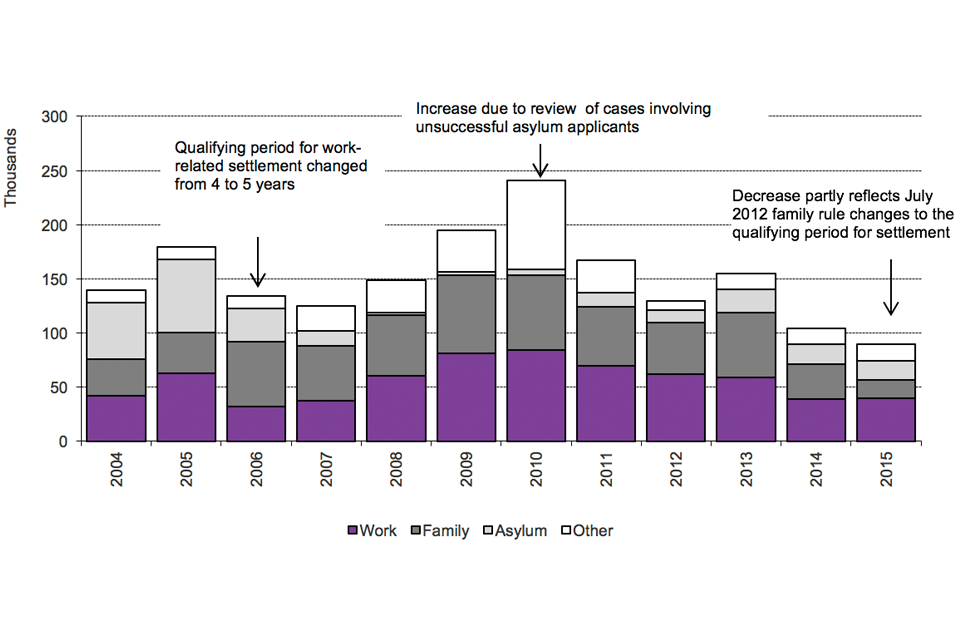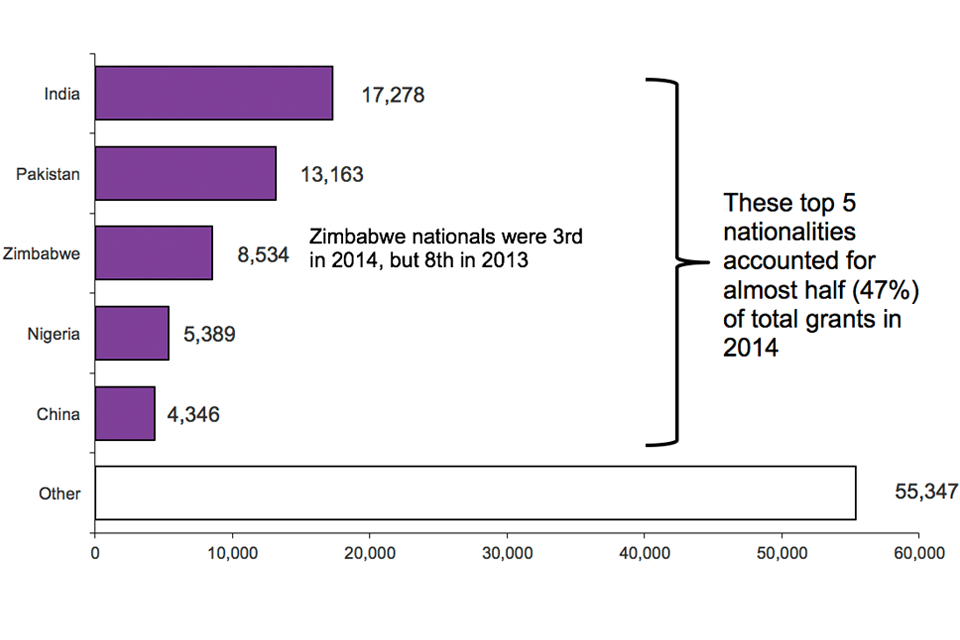Settlement
Updated 3 March 2016
Valid: 25 February 2016 to 25 May 2016
Data relate to the calendar year 2015 and all comparisons are with the calendar year 2014, unless indicated otherwise.
Back to ‘Immigration statistics October to December 2015’ content page.
This is not the latest release. View latest release.
1.Key facts
The number of people granted permission to stay permanently fell by 14% to 89,932 in 2015 driven by a fall in family-related grants (-16,236).The number of grants is low relative to the peak number of grants in the year ending September 2010 (241,586), and similar to levels seen in 1999 (97,117).
Work-related grants to stay permanently increased by 3% (+1,108) to 39,820 in 2015. This increase followed earlier falls from 92,176 in the year ending June 2010 to 38,712 in 2014. Grants in the Tier 2 Skilled Work category rose from 11,163 to 16,436 whilst settlement granted after 5 years with a work permit decreased from 2,637 to 424 reflecting the replacement of the work permit scheme by the Points-Based System. Grants to Tier 1 High Value individuals fell from 20,479 to 18,829.
Family-related grants to stay permanently fell by nearly a half (-49%) to 16,610 in 2015. There were notable decreases in grants to wives (from 18,704 to 9,336), husbands (from 9,526 to 4,717) and children (from 4,101 to 2,338). This may partly reflect changes to the rules in July 2012 on how quickly partners qualify for settlement and the number of visas and extensions granted in previous years. Details of the July 2012 rule changes are included in the Family section of the user guide.
Asylum-related grants to stay permanently rose 2% to 18,187 in 2015 but this is significantly lower than the peak in 2005 (67,810).
These year-on-year comparisons of decisions numbers can be affected by changes in case work resource allocation. Such fluctuations can be examined in more detail in the quarterly data that are also available in the published tables.
2.Grants to stay permanently by reason, and refusals
| Year | Total decisions | Total grants | Work | Asylum | Family | Other (1) | Refusals |
| 2011 | 174,933 | 166,878 | 69,892 | 13,003 | 54,086 | 29,897 | 8,055 |
| 2012 | 133,850 | 129,749 | 62,195 | 11,434 | 47,374 | 8,746 | 4,101 |
| 2013 | 161,375 | 154,701 | 59,288 | 21,274 | 59,654 | 14,485 | 6,674 |
| 2014 | 109,072 | 104,057 | 38,712 | 17,801 | 32,846 | 14,698 | 5,015 |
| 2015 | 95,210 | 89,932 | 39,820 | 18,187 | 16,610 | 15,315 | 5,278 |
| Change: latest 12 months | -13,862 | -14,125 | +1,108 | +386 | -16,236 | +617 | +263 |
| Percentage change | -13% | -14% | +3% | +2% | -49% | +4% | +5% |
Table notes
Source: Home Office, Immigration Statistics October to December 2015, Settlement table se 02 q.
(1) The high number of grants in 2011 mainly resulted from a review of the backlog of cases from before March 2007 involving unsuccessful asylum applicants.
3.Long-term trends in grants to stay permanently
The chart below illustrates longer-term trends in grants to stay permanently for the calendar years back to 2004.

The
Chart notes
Source: Home Office, Immigration Statistics October to December 2015, Settlement table se 02.
4.Nationalities granted permission to stay permanently
Data for grants by nationality in 2015 are planned to be published in Immigration Statistics April to June 2016, due to be released on 25 August 2016.
Of the total 104,057 grants of permission to stay permanently in 2014, over a third (37% or 38,820) were to nationals of South Asia and over a quarter (27% or 28,240) were to nationals of Sub-Saharan Africa.
Top 5 nationalities granted permission to stay permanently, 2014
(Total number of grants: 104,057, includes dependants)

The
Chart notes
Source: Home Office, Immigration Statistics October to December 2015, Settlement table se 03.
5.Data tables
Further data on settlement are available in Settlement tables se 01 to se 06
6.Background information
The figures in this section relate to the number of people, subject to immigration control, who are granted or refused permission to stay permanently in the UK, known as settlement.
The numbers of applications and decisions about permission to stay permanently reflect changes over time in levels of those entering the country, as well as policy and legislative changes. These may affect the number of people potentially eligible to stay permanently. The availability and allocation of resources within the Home Office can also affect the number of decisions.
Migration Transparency Data webpage A range of key input and impact indicators are currently published by the Home Office on the Migration Transparency Data webpage.
Staying in the UK In February 2016 the Home Office published its ‘Migrant Journey: Sixth Report’, which shows how non-EEA migrants change their immigration status or achieve settlement in the UK.
